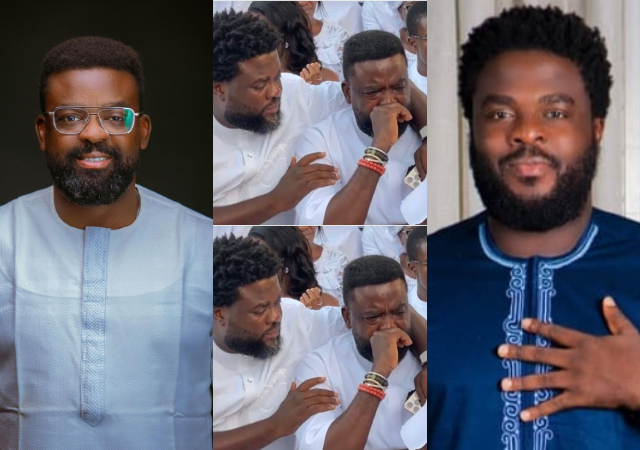Renowned filmmaker Kunle Afolayan has shared profound insights into his relationship with younger brother Aremu Afolayan, revealing a deeper familial connection that transcends traditional brotherhood. The revelation came during their mother’s wake-keep ceremony on Friday, marking a significant moment in the healing of their long-standing rift.
The emotional reconciliation between the Afolayan brothers, which began following their mother’s recent passing, has taken on new depth with Kunle’s revelation that he served as a father figure to Aremu for a decade of his life. During the wake-keep, Kunle made the stirring declaration, “I am not his brother, I’m his father, I was the one that raised him for 10 years,” adding a complex layer to their family narrative while also pointing to external influences that he believes contributed to their estrangement.
Their reunion, which first caught public attention through social media when they were spotted together at Kunle’s film village in Komu, Oyo State, represents a significant shift in their relationship. The brothers, whose rift became public knowledge years ago when Aremu allegedly made controversial statements about their family’s financial status, have now found common ground in their shared loss.
The reconciliation has particular significance within the context of their mother’s passing, which Kunle announced on his Instagram page just days ago. His message reflected the profound impact of their loss, acknowledging the difficulty in accepting her death while finding solace in the quality of life she lived. This sentiment was echoed across their family, with both brothers taking to social media to share their grief.
The entertainment community’s response to both their loss and reconciliation has been overwhelming, with numerous Nollywood veterans including Jide Kosoko, Adebayo Salami, Lola Idije, Femi Adebayo, and others stepping forward to offer condolences and support. This outpouring of support highlights the respected position the Afolayan family holds within Nigeria’s entertainment industry.
Kunle’s revelation about his paternal role in Aremu’s life adds a compelling dimension to their family story. His statement during the wake-keep, which included a pointed observation about external influences that he believes contributed to their estrangement, suggests a complex family dynamic that goes beyond simple sibling rivalry. The mention of “ladies” as a factor in their separation hints at personal relationships that may have complicated their brotherly bond.
The public reaction to their reconciliation has been overwhelmingly positive, with social media users expressing joy and emotion at seeing the brothers together again. Comments ranging from expressions of their mother’s presumed pride to tearful responses indicate how deeply their reunion has resonated with the public.
This reconciliation represents more than just a personal healing between two brothers; it speaks to the broader themes of family bonds, forgiveness, and the power of shared grief to bridge seemingly insurmountable differences. The timing of their reunion, coinciding with their mother’s passing, adds a layer of poignancy to their story, suggesting that even in death, a mother’s influence can bring her children together.
The Afolayan brothers‘ story is particularly significant within the context of Nigerian entertainment, where family legacies often play a crucial role in the industry’s development. Their reconciliation not only heals a personal rift but also strengthens a significant family dynasty in Nollywood.
As the brothers move forward from this moment, their reconciliation offers hope and inspiration to others facing similar family conflicts. Their story demonstrates that even years of estrangement can be overcome through understanding and the recognition of deeper family bonds that exist beyond surface-level disagreements.
The entertainment industry and fans alike now watch with interest as this new chapter in the Afolayan family story unfolds, hoping that this reconciliation marks the beginning of a stronger, more united future for these influential figures in Nigerian cinema.




